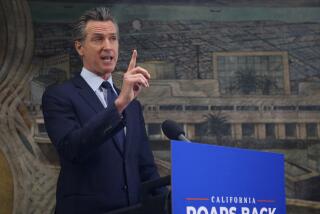REVENUES : Alaska Faces Bind as Oil Flow Slows : Closing its fiscal gap will require spending cuts, using earnings from a fund and a broad-based tax, expert says.
FAIRBANKS, Alaska — It was a land so bountiful that its citizens abolished their income taxes and long ago gave up any idea of a state sales tax. Even so, the government embarked on a heady program of school construction, welfare, courthouses and roads--spending at twice the national average and transforming a frozen land of backwater villages into a modern state.
And still, the public trough overflowed. The government picked up its checkbook and handed out $983 a year to everyone living inside its borders. An extra $250-a-month bonus was paid to anyone over the age of 65.
This fiscal nirvana began with the discovery of North America’s largest oil field, a black bonanza that fueled Alaska’s leap into the 20th Century and left those hardy enough to live here the nation’s most fiscally pampered citizens.
Someday, everyone knew, it had to end. And as the North Slope oil tap that has provided 85% of the state’s revenues in recent years slows down along with international oil prices, Alaska--for years known as a tax heaven of celestial proportions--is facing a budget crunch of the nightmare variety.
The spending deficit, already running at $513 million, is predicted to reach $1.3 billion over the next five years. Budget reserves, which have bridged the shortfall so far, will be exhausted during the same period if nothing is done.
And yet, what’s to be done? Alaskans, by now accustomed to government largess, appear disinclined to give it up. A state financial planning commission, which this month began hearings on a plan to close the budget gap, realized early that Alaskans would balk at giving up their $983-a-year dividends, said the commission chairman, Brian Rogers.
“What we didn’t realize at the time, and should have, is that a universal entitlement program is about as sacred a cow as you can create,” he said.
The annual dividend, distributed from the multibillion-dollar Permanent Fund that was established to help preserve Alaska’s oil wealth for future generations, has since become a major part of the economy in the Alaskan bush and one of the most popular political programs in history.
Dividend checks come strictly from interest on the fund and vary depending on how much money is in there. Some have suggested the fund could be raided for $200 million to $400 million a year and still maintain annual dividends of about $900 annually.
Yet even that won’t be enough to bail out a state that is collecting revenues at a third the national average and spending double the national rate.
Making big cuts in state spending isn’t seen as the most attractive option, because it would lead to a corresponding loss of jobs. Raising taxes, even in a largely conservative state, is seen as an easier sell.
The $250 senior citizen bonus already is being phased out over the next several years, a move that will restore about $75 million a year. And the state is looking at a possible new excise tax on tobacco that would make it the highest in the nation and bring in $42 million a year.
But Oliver Scott Goldsmith of the University of Alaska’s Institute for Social and Economic Research, which has warned of the budget crunch for years, said it will take a combination of decreased spending, use of the Permanent Fund earnings and a broad-based tax on income or sales to close the fiscal gap.
A large number of Alaskans seem to be waiting for the next big bonanza, turning their sights on a controversial proposal to begin oil drilling in the pristine Arctic National Wildlife Refuge, a move bitterly fought by environmentalists but supported by the state’s Republican-dominated congressional delegation and even Democratic Gov. Tony Knowles.
Yet Goldsmith and others say the hope that ANWR will bail out the state is illusory. Any oil found there would be too little and too late to affect the looming budget crisis.
There seems little doubt that the Permanent Fund will be raided, more likely sooner than later, and the biggest question is, who will be left standing in the political firestorm that follows?
“I think we’re seeing a massing of the political will now,” Rogers said. He said the creation of the state commission marked the first step toward committing the necessary evils. “They need political cover, and we’re there in part to provide political cover. Nobody’s name has to be on the [tax or funding cut] bill except ours.”
(BEGIN TEXT OF INFOBOX / INFOGRAPHIC)
Alaska Oil Revenue
The oil money flowing into the state’s coffers is starting to dwindle, and huge bonuses and low taxes that residents have enjoyed may be curtailed. The state owns Prudhoe Bay, the largest oil field in North America, and collects taxes and royalties from its production.
The Good Times . . . and the Tough Times Ahead
The average Alaskan household received in payments and services more than 10 times what it pays in state and local taxes, below left. But that will change as oil revenue plummets well into the next century.
Average household receives: $22,200
Average household taxes: $2,000
Source: Office of Budget and Management, Alaska Department of Revenue
More to Read
Sign up for Essential California
The most important California stories and recommendations in your inbox every morning.
You may occasionally receive promotional content from the Los Angeles Times.










